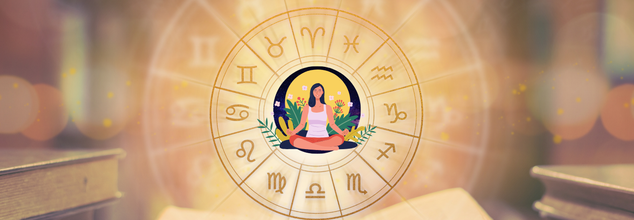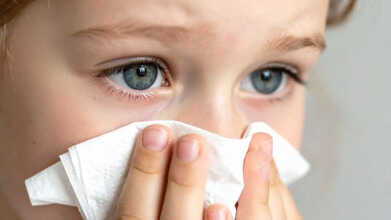- Health Conditions A-Z
- Health & Wellness
- Nutrition
- Fitness
- Health News
- Ayurveda
- Videos
- Medicine A-Z
- Parenting
Weekly Health Horoscope For December 15-21, 2024: Spend Time Relaxing With Deep Breathing Exercises

Weekly Health Horoscope
Aries
Aries people are advised to adopt a regular weekly health regimen. Yoga or stretching first thing in the morning helps set a good tone and strengthen resistance against stress. Because of a higher workload, midweek may cause mental tiredness; hence, keeping balance depends mostly on giving relaxation and enough water top priority. To increase general wellbeing and raise energy levels, your diet should consist in lots of fruits and vegetables. Tension might be released by spending quiet times in nature or by engaging in a creative pastime. If you follow these ideas, by the weekend you could find a difference in mental clarity as well as physical energy.
Taurus
Taurus people have the opportunity to realign with their health goals this week. Starting a new exercise program—such as team sports or gym membership—will revitalize your body and mind. Improving digestion and preventing pain will depend on cutting back fried and processed foods. After engaging in mindfulness activities or a relaxing meditation session, you could experience a sudden mental clarity. Set aside some time toward the end of the week for a spa day or leisurely nature walk to decompress and revitalize. Your strength and concentration will be much enhanced by simple but controlled routines.
Gemini
For Gemini people who want to include holistic health techniques into their way of life, this week is perfect. Yoga and Ayurveda could become transforming friends in enhancing mental and physical health. Midweek could bring some tiredness; hence, give mild exercise top priority and make sure your meals include raw fruits, leafy greens, and hydrating foods to replenish your energy. Steer clear of overworking and missing meals since these could throw off your normal rhythm. The weekend presents a great chance for you to get back in touch with friends and relatives, therefore improving your mental state and attitude. Focusing moderation and balance can help you to feel rejuvenated.
Cancer
Cancer natives should concentrate on creating a regular wellness schedule. To increase endurance and strength, think about looking at outdoor activities or a fitness class. If you follow a rigorous schedule early in the week, you might find improvements in chronic medical conditions. Short meditation breaks during the day or deep breathing techniques help one to properly control stress. Steer clear of decadent meals and give clean eating first priority if you want to stay active. A reflective weekend spent journaling or practicing self-care will boost your general vigour and help you to build mental tranquillity.
Leo
Leos should concentrate on giving self-care top priority and tackling any long-standing health issues this week. Including whole grains and fresh fruits—nutrient-dense foods—into your diet will help digestion and increase your energy. A light workout program or a fast morning walk will help you start your day in a good attitude. You might feel some tiredness midweek, thus it's important to have enough breaks and peaceful sleep. Meditating or a peaceful yoga practice will enable you to clear your mental state. If you follow these ideas, by the weekend you should probably feel more grounded and energised.
Virgo
For Virgo people trying to improve their health, this week seems bright. While a nutrient-dense diet will help you complement your efforts, dedication to a disciplined fitness program will produce great results. Even little health problems should be taken note of and quickly addressed to prevent consequences. Stress will be reduced by include relaxing techniques as journaling or nightly meditations. Maintaining energy requires a mix between rest and physical exercise. Treat yourself to a soothing exercise that works your body and mind at the conclusion of the week.
Libra
If libras concentrate on mindfulness and exercise, they probably will have a health improvement this week. Beginning your mornings with a yoga or walking practice can help you to establish the mood for a good day. Including lean meats and a range of vibrant veggies in your meals helps increase your energy. Time spent on joyful hobbies or artistic interests helps one control stress. If you follow these behaviours by midweek, you can find a boost in energy and optimism. The weekend is ideal for rejuvenation via silent meditation or nature treks.
Scorpio
Scorpios should concentrate this week on striking a balance between their mental and physical states. Maintaining your energy all through the week will depend mostly on hydration and appropriate diet. Your stamina will be much enhanced by daily light activities as stretching or walking. Now is the moment to take care of little health problems you have been neglecting. Light-hearted activities and socializing will help one find mental release and a feeling of connection. Spend time relaxing with deep breathing exercises, which will also help to properly control stress.
Sagittarius
This week will be good for Sagittarius natives to start new healthy practices. Positive comments from a regular check-up could inspire you to keep up a better lifestyle. Including nutritious grains, fresh veggies, and greens into your meals will boost immunity and help digestion. Midweek, concentrate on breathing exercises to keep balance and quiet your thoughts. Your great energy will help you easily reach your fitness objectives; but, remember to rest enough. By the weekend, you could be rejuvenated and ready to create fresh wellness goals for the next week.
Capricorn
Capricorns should use this week to reaffirm their health-conscious objectives. Including consistent exercise into your daily schedule will increase mental as well as physical resilience. Staying hydrated and eating meals high in nutrients will help you fight tiredness and keep concentrated. Problems at work could surface, but keeping a cool head and a good attitude helps to avoid too much stress. The weekend is a great time to indulge in leisurely, mental and physical rejuvenating activities like reading or gardening. Most likely, you will leave the week feeling inspired and invigorated.
Aquarius
Aquarius people will gain from a week emphasizing consistency in health habits and discipline. Establish reasonable objectives and keep a diet high in proteins to renew your will to be physically fit. Cycling or hiking can help you increase your stamina and improve your mood; midweek is the perfect time to investigate these pursuits. Steer clear of too indulging in processed or sugary foods since they could throw off your energy level. By means of yoga or meditation, mindfulness will allow you to maintain a focused and pleasant attitude. By the conclusion of the week, you might find fresh drive toward long-term wellbeing.
Pisces
Native Pisces people are encouraged to focus especially on their physical activity and dietary consumption this week. Regular health visits could show changes, thereby increasing your confidence in your present way of living. Including additional fiber and water into your diet will help with hydration and digestion. Light workouts include yoga or swimming will keep you moving and away from stress. Spending leisure time in serene surroundings might help you to rejuvenate your spirit and mind. By the conclusion of each week, you will probably feel more balanced and ready to keep up these good practices moving ahead.
Adenovirus: Is The Mystery Illness That’s Spreading Highly Contagious?

Credits: Canva
A little-known virus is spreading steadily across different parts of the world, prompting growing concern among health experts. Often described as “untreatable” because there is no targeted antiviral medicine available, adenovirus is drawing attention due to how tough it is and how quickly it can pass from person to person.
Eric Sachinwalla, medical director of infection prevention and control at Jefferson Health, has cautioned that while most healthy individuals develop only mild illness, people in high-risk groups may face more serious health problems. This raises an important question: just how contagious is this mystery illness that is spreading?
Adenovirus: How Contagious Is It?
Yes, adenovirus is highly contagious and spreads with ease in several ways. It can pass through respiratory droplets released during coughing or sneezing, close physical contact such as hugging or shaking hands, and contact with contaminated surfaces like toys and towels.
It can also spread through fecal matter, particularly during diaper changes, and in some cases through water. According to the CDC, the virus spreads quickly in crowded settings such as schools and daycare centres and can survive for long periods on surfaces, making good hygiene especially important for young children and people with weakened immune systems.
Who Do Adenoviruses Affect Most?
Adenoviruses can infect people of all age groups, but they are most commonly seen in children under the age of five. In babies and young children, the virus often spreads in daycare environments where close contact is common. Children are also more likely to put shared objects in their mouths and may not wash their hands as regularly.
Among adults, adenoviruses tend to spread in crowded living conditions. People staying in dormitories or military housing may have a higher risk of infection. The virus is also known to circulate in hospitals and nursing homes, as per CDC.
Those with weakened immune systems are more likely to become seriously ill from an adenovirus infection. This includes people who have undergone organ or stem cell transplants, as well as those living with cancer or HIV/AIDS. Individuals with existing heart or lung conditions may also face a higher risk of severe illness.
Adenovirus: What Are The Symptoms Of An Adenovirus Infection?
The symptoms of an adenovirus infection depend on the part of the body affected. Most commonly, the virus targets the respiratory system. When it infects the airways, it can cause symptoms similar to a cold or the flu. These may include:
- Cough.
- Fever.
- Runny nose.
- Sore throat (pharyngitis).
- Pink eye (conjunctivitis).
- Ear infection (otitis media).
- Swollen lymph nodes.
- Chest cold (bronchitis).
- Pneumonia.
Adenoviruses can also infect the digestive system. When this happens, diarrhea may occur, along with gastroenteritis. Gastroenteritis is inflammation of the stomach or intestines and can lead to stomach pain, diarrhea, nausea, and vomiting.
In rarer cases, adenoviruses can affect the bladder or the nervous system. Infection of the bladder may result in urinary tract infections. When the nervous system is involved, it can lead to serious conditions affecting the brain, including encephalitis and meningitis.
Flu Incubation Period: How Long Does It Take For Symptoms To Appear?

Credits: Canva
Influenza, commonly called the flu, is a respiratory infection caused by the influenza virus. It is contagious, which means it passes easily from one person to another. Although influenza viruses can circulate throughout the year, infections are seen more often during the fall and winter months. This time is known as the flu season. As flu cases are rising across many parts of the US and UK, here are a few key points to understand, from the incubation period to how easily the virus spreads.
What Is The Flu (influenza)?
The flu is an infection caused by the influenza virus. It usually leads to symptoms such as body and head aches, sore throat, fever, and breathing-related discomfort, which can sometimes become serious. Flu cases tend to peak during the winter months, when large numbers of people may fall ill at the same time, a situation described as an epidemic, according to the Cleveland Clinic.
Flu: What Is The Incubation Period Of The Flu?
The average incubation period of the flu is around 2 days, though it can vary from 1 to 4 days. In simple terms, this means most people begin to notice flu symptoms a few days after the virus enters the body.
When Does The Flu Become Contagious?
After catching the flu virus, a person can start passing it on to others about 1 dayTrusted Source before symptoms appear. Keep in mind that the usual incubation period is about 2 days. So, if someone is exposed to the virus on a Saturday morning, they may already be able to spread it by Sunday evening. By Monday afternoon, flu symptoms are likely to show up. These symptoms can be mild or severe.
Some people may not develop symptoms at all, but they can still spread the virus. The flu is usually most contagious during the first 3 days of illness. After symptoms begin, a person may continue to infect others for another 5 to 7 days. Children, older adults, and people with weaker immune systems may remain contagious for a longer time.
Flu Symptoms 2025: Early Symptoms You Need To Take Care Of
Unlike the common cold, which tends to develop slowly, flu symptoms often appear suddenly.
Common symptoms include:
- feeling extremely tired, exhausted, or weak
- headache
- blocked or runny nose
- sore throat
- dry cough
- muscle and body aches
- fever or chills, although not everyone gets these
- vomiting or diarrhoea, which is seen more often in children
Most people start to feel better within a few days to two weeks. However, some individuals may need antiviral medication, particularly those at higher risk of serious complications.
How Does The Flu Spread?
The flu mainly spreads through tiny respiratory droplets released when an infected person coughs or sneezes. In crowded places, these particles can be inhaled by others, leading to infection. The virus can also spread by touching objects or surfaces that carry the virus, such as door handles or shared personal items. Outside the body, the virus can survive on surfaces for up to one day.
If someone touches a contaminated surface and then touches their eyes, nose, or mouth, the flu virus can enter the body and cause infection.
Taking Warfarin? Doctor Warns This Common Food Could Be Reducing Your Medication’s Effect

Credits: Canva
People who are prescribed blood thinners, also known as anticoagulants, could unknowingly weaken the effect of their medication by eating a widely consumed and otherwise healthy vegetable, a doctor has warned.
What Are Anticoagulants?
Anticoagulants are routinely given to reduce the risk of blood clots and are often prescribed to those who face a higher chance of such complications. This group also includes people at increased risk of heart attacks or strokes. These medicines, which include rivaroxaban, apixaban and warfarin, work by interrupting the clotting process and play a key role in preventing serious conditions such as strokes, heart attacks, pulmonary embolism and deep vein thrombosis.
Warfarin: Why This Common Vegetable Can Be A Problem
While anticoagulants are effective and often lifesaving, patients are being advised that a familiar garden vegetable could interfere with how well these drugs work. The warning comes from Dr Chris Steele, who appeared on ITV’s This Morning to explain how certain foods can interact negatively with different medications.
As part of his advice, he said, as per Express, “Leafy greens are high in vitamin K, which helps blood to clot. Warfarin works by blocking vitamin K production, so if you suddenly increase how many greens you eat, it can affect how the medicine works.”
He added: “Other foods that contain a lot of vitamin K include green vegetables, egg yolks, chickpeas and lentils. These foods don’t need to be removed from the diet, but it is important to keep your intake steady and consistent. You should also avoid drinking large amounts of cranberry juice or using cranberry products while on anticoagulants, as they can alter the effect of warfarin. Garlic and ginger should be limited too, as they can raise the risk of bleeding.”
Warfarin: Other Food And Drug Interactions To Watch For
Dr Chris also highlighted that many other medicines can react in unexpected ways when taken alongside certain foods and drinks. For example, he noted that some antibiotics, including ciprofloxacin, can react poorly with milk.
He explained: “Calcium can reduce how well some antibiotics work, so these medicines should not be taken at the same time as foods high in calcium, such as milk, yoghurt or cheese. Calcium supplements should also be avoided for a few hours before and after taking these antibiotics.
“You should not drink milk when taking certain antibiotics, including tetracycline and ciprofloxacin, which are quinolone antibiotics, or some osteoporosis drugs like alendronate, also known as Fosamax.”
He further advised avoiding the following combinations with specific medicines:
- Grapefruit if you are taking statins for high blood pressure
- Black liquorice if you are on certain heart medicines such as digoxin
- Bananas if you take some ACE inhibitors for high blood pressure
- Coffee if you use bronchodilators for asthma
- Smoked salmon and salami if you are prescribed antidepressants
- Limes if you are taking cough medicine
Dr Chris stressed: “Always speak to your doctor about any precautions you should follow when starting a new medication. You may need to avoid certain foods, make changes to your lifestyle, or take other steps to prevent unwanted side effects.”
© 2024 Bennett, Coleman & Company Limited

